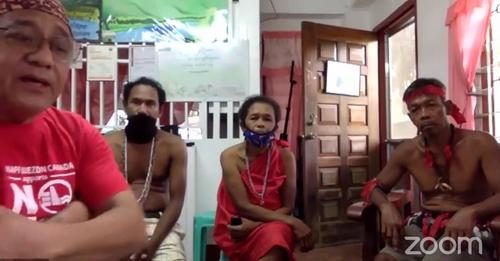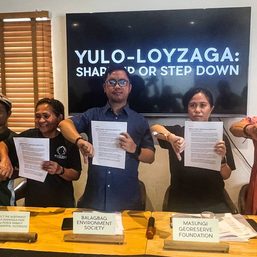SUMMARY
This is AI generated summarization, which may have errors. For context, always refer to the full article.

With strict quarantine measures already affecting their livelihood, indigenous people (IP) leaders in Quezon and Rizal provinces urged the government to prioritize giving aid to suffering communities instead of focusing on the Kaliwa Dam project.
Despite the worsening pandemic, construction of the access road leading to the planned reservoir in General Nakar town in Quezon is underway. This is despite the fact that the project pushed through without the prior consent of indigenous communities or an environmental clearance, according to Lean Miguel Novero, communications committee head of the STOP Kaliwa Dam Network.
Agta-Dumagat-Remontado tribe leaders from General Nakar, Quezon and Tanay, Rizal shared during a press conference commemorating World Indigenous People’s Day on Monday, August 10, how they are struggling to make ends meet during the pandemic.
They told about how the pandemic has added another layer to their suffering on top of their long-standing fight against the construction of the Kaliwa Dam.
According to Conchita Calzado, traditional leader of the Katutubong Agta-Dumagat in Quezon, the emergency subsidy they received a month ago barely helped families get by during the pandemic.
“We don’t even know when the next [emergency subsidy] will come; we don’t have permanent sources of livelihood,” she said in Filipino.
She added that the members of their tribe heavily relied on vegetables they planted around their houses for their food during quarantine.
Even if they wanted to earn money from these vegetables, they have no one to sell them to. The situation has forced some IP families to limit their daily meals, Calzado said.
Managed by the Metropolitan Waterworks Sewerage System (MWSS), the P12.2 billion Kaliwa Dam construction or the New Centennial Water Supply Project has been pushed by the government as the solution to Metro Manila’s water shortage, boasting how the dam can supply up to 600 million liters of water daily.
“I hope we focus on solving simpler problems instead of focusing on the complicated implementation of projects [such as the Kaliwa Dam], especially if these projects would lead to environmental degradation,” Calzado said.
Renato Ybanez, president of the Samahang Uugit sa Karapatan ng mga Katutubong Dumagat-Remontado sa Lupang Ninuno in Tanay, Rizal, said that tribe members who wanted to fish were also barred from going to some bodies of water near the access road, citing quarantine regulations.
Ybanez added that locals have also been barred from entering or going near the access road construction site since 2018.
IP leaders raised, however, how Chinese engineers and designers have been spotted in the construction sites in General Nakar to continue “studying” the area.
Calzado urged government to focus first on addressing the needs of the community rather than continuing the Kaliwa Dam project.
“Let us not focus on the implementation of the Kaliwa Dam project. Our current situation is that many of our members are left without their livelihoods; they only rely on the assistance from the government,” said Calzado
Advocacy groups composed of Dumagat-Remontado tribe members and other activists have strongly opposed the Kaliwa Dam project, including the access road, over worries that it would damage the environment and force them to abandon their ancestral lands.
The access road also traverses sacred sites and burial grounds of the local Dumagat-Remontado tribe.
A month after the construction of the access road started in June 2018, suspected New People’s Army rebels showed their opposition to the effort by burning the construction equipment. Construction was only continued over a year later in August 2019.
As of May 2020, citing information from the Protected Area Management Board, IP leaders said there are only 4 to 5 km left before the access road reaches the main site of Kaliwa Dam, showing continued construction of the road.
Weighing the pros and cons
Maria Clara Dullas, president of the Kababaihang Dumagat sa Sierra Madre, called on government to stop the construction of the access road, and assess whether the project’s benefits outweigh the damage it might cause.
“We’re all affected here, indigenous or not…Us IPs, we are not denying anyone of resources we know we can share with our fellows but let us investigate if these [projects] are proper and wouldn’t harm the environment,” Dullas said during the press conference.
Conrad Vargas, Prelature of Infanta Community Organization of the Philippines Inc. Executive Director, said the Kaliwa Dam could destroy ecosystems in the Sierra Madre region, as well as the rain forests which provide the water for lakes and rivers in the area.
At a civil society Webinar “Kaliwa-Damay-damay: Isang Pagususuri sa Isyu ng Kaliwa Dam,” held last June, conservation specialists raised the Kaliwa Dam’s potential and irreparable harm to the region’s intricate ecological balance.
Khalil Panopio, a Haribon Foundation conservation specialist, pointed out that the construction of the Kaliwa Dam will inundate 267 hectares of land, including 203 hectares of carbon-absorbing forest that provides badly needed oxygen to city residents in heavily polluted Metro Manila.
Many endangered plant and animal species, some of them found only in the Philippines, will disappear, further undermining the country’s biodiversity. The affected species found in the area include the Yakal-Saplungan, Bagtikan, white lauan, and tanguile, which are considered critically endangered by the International Union for Conservation of Nature.
Panopio said that the destabilizing effects on nature may release dormant viruses which bats or other displaced forest creatures will carry outward to urban dwellers.
Many experts have, however, questioned a large dam as the solution. Having evaluated the project, the National Economic Development Authority has even said that the construction of the dam may cost far more than it can gain. It particularly noted that this could risk passing increased water rates on to concessioners and consumers.
The Kaliwa Dam has so far received an environmental compliance certificate from the Department of Environment and Natural Resources despite alleged violations in completing or fulfilling its procedural requirements.
It’s also funded by a loan from China that covers 85% of the P12.2-billion project, with the China Energy Engineering Corporation designated to do the construction.
Echoing the call
Sectors and Peoples Totally Opposed to the Kaliwa Dam project or STOP Kaliwa Dam, the organizer of the press conference, have called on the Senate Committee on Cultural Communities to shelve the opposed Kaliwa Dam project.
They have also started an online petition to stop the construction of the reservoir.
The petition has since garnered over a hundred thousand signatures. To add your signature, go to this link. – with reports from Loreta Arroyo, Dr Mary Racelis, and Maria Kathrina Antonio/Rappler.com
Add a comment
How does this make you feel?

![[Rappler’s Best] US does propaganda? Of course.](https://www.rappler.com/tachyon/2024/06/US-does-propaganda-Of-course-june-17-2024.jpg?resize=257%2C257&crop=236px%2C0px%2C720px%2C720px)








There are no comments yet. Add your comment to start the conversation.